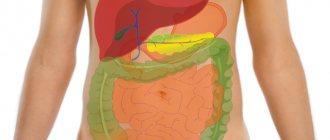The appearance of an unpleasant odor from the mouth, medically called “halitosis,” is a signal of trouble in the growing organism. Kaliningrad residents can notice this symptom when communicating with a child, laughing or kissing.
In most cases, odor occurs due to poor hygiene, which disrupts the balance of microflora in the mouth and increases the number of pathogenic microorganisms. During the decomposition of bacteria, compounds of hydrogen sulfide and nitrogen are formed, which are exhaled along with the air.
In this situation, the problem can be solved with the help of hygiene and does not pose any danger to the child’s health. However, there may be other reasons for the appearance of a specific odor from the mouth. In what cases should parents be wary - we will find out further...
Risk factors affecting fresh breath
Let's start by identifying the reasons that negatively affect healthy breathing. At the same time, we note that microflora imbalance can occur even in healthy children. This happens for a number of reasons:
- failure to comply with hygiene rules, as we have already outlined;
- dry mouth due to insufficient saliva;
- insufficient water and fluid intake;
- breathing through the mouth, out of habit or due to nasal congestion;
- oral infections (untreated caries, gum disease, etc.);
- consumption of foods with a pungent odor (garlic, onions) or those that provoke fermentation (legumes, grapes);
- taking medications;
- hormonal imbalance;
- smoking (relevant for teenagers).
Thus, in most cases, the cause of bad breath is problems in the oral cavity, infections and poor diet.
Surgical pathologies
Inflammation of the appendix is difficult to diagnose in a baby in the first year of life, since the baby cannot show where it hurts. The disease is dangerous because it develops at a hurricane pace. And from the onset of the inflammatory process to the rupture of the organ, only a few hours can pass.
Symptoms of the pathological process:
- anxiety;
- weakness and apathy - the baby lies and does not want to play or move;
- forced pose - the toddler turns over on his right side and assumes a fetal position;
- fever, chills, fever;
- lack of appetite with increased thirst;
- vomit;
- diarrhea is profuse and repeated.
Such symptoms require immediate hospitalization of the child in the surgical department. If diagnosis is difficult, diagnostic laparoscopy is indicated.
How to distinguish a normal smell from a problematic one?
If an unpleasant symptom occurs exclusively in the morning and goes away after brushing your teeth, then we are talking about a physiological norm. If bad breath is observed after hygiene procedures and becomes protracted, then this deviation requires the closest attention from parents.
In addition, it is worth noting that the above risk factors can be eliminated. However, if hygiene is maintained, respiratory infections and specific foods are excluded, and the unpleasant symptom persists for a long time, this is a good reason to consult a doctor.
In this case, altered breathing can signal very specific diseases. Let's look at which ones further...
Intestinal infections
In a newborn, diarrhea is a sign of dysbiosis
Intestinal infections are caused by an imbalance of opportunistic flora and damage by pathogenic bacteria. Diseases of this kind are contact diseases. Therefore, parents need to comply with all hygiene standards for themselves and their baby.
Signs of intestinal infection:
- loose, frequent stools;
- the presence of a large amount of mucus in the stool, pieces of undigested food, and in severe cases - blood;
- abdominal pain - the baby screams and pulls his legs towards his tummy;
- anxiety;
- there may be a refusal to eat, the baby does not want to breastfeed;
- increased body temperature;
- general weakness, lack of activity;
- vomit;
- drowsiness.
If such symptoms appear, the child should be immediately shown to a pediatrician. You may need to be hospitalized in the infectious diseases department of the hospital and take hydration measures.
List of diseases that can be detected
Despite the fact that halitosis is not a disease, it is an important diagnostic symptom by which a specialist can assume the presence of a certain disease in the body. Suspected health problems may include:
- diseases of the nose and nasopharynx: sinusitis, pharyngitis, tonsillitis, adenoiditis;
- food allergies or respiratory rhinitis causing nasal congestion;
- dental diseases of teeth and gums;
- Gastrointestinal diseases: gastritis, increased stomach acidity, intestinal dysbiosis, etc.;
- endocrine disorders: diabetes, thyrotoxicosis, etc.
As can be seen from this impressive list of diseases, solving breathing problems can fall within the competence of a variety of highly specialized specialists: otolaryngologist, dentist, gastroenterologist, endocrinologist.
Prevention
Prevention and treatment of dental diseases in children should be carried out every six months. Children should be seen by a pediatric dentist. It is necessary to treat the underlying disease, then the stench will disappear. If it is caries, it is necessary to carry out sanitation, get rid of stones and install fillings. An illness in an infant requires proper feeding of foods that are well absorbed by the newborn’s body. If you have abdominal pain, you should not delay a visit to the pediatrician to avoid complications. It is important to constantly adhere to these rules:
- Systematic daily thorough oral hygiene.
- If the chewing organs have just erupted, it is worth using a finger brush.
- Parents should supervise the process of cleansing the tongue, incisors, canines, molars, cheeks, and palate.
- For cleansing, dentists recommend using sterile gauze wipes, which the mother should soak in boiled water.
- Older children should use mouth rinses and dental floss.
It is important that children do not eat a lot of sweets. The child's drinking regime should be sufficient. It is not recommended to give your little one soda or store-bought juices. It’s better to cook compote for your child and squeeze the juice out of the fruit. Avoid family scandals and conflicts. After all, constant stress and negativity weakens the baby’s delicate nervous system. Only love and care create excellent preconditions for good health.
What can a smell “tell”?
As we mentioned earlier, unhealthy breath can quite eloquently indicate a certain nature of the disease. For example:
- a sour smell indicates problems with the stomach: high acidity, reflux or dysbacteriosis;
- the smell of a rotten egg - about a stomach ulcer or a violation of bile outflow;
- putrefactive – about diseases of the esophagus and low acidity of the stomach;
- acetone – about problems with blood sugar levels (diabetes) or dehydration;
- ammonia - about kidney disease, liver dysfunction and diffuse toxic goiter;
- boiled cabbage - problems with metabolism, liver and kidney diseases.
As a rule, already at the stage of collecting anamnesis and during the clinical examination, the doctor can make an assumption about the true causes of the problem.
Fecal incontinence in a child, children
Fecal incontinence (encopresis) is a functional disorder of defecation in which there is a dysfunction of the rectum and external or internal sphincters of the anus, manifested by involuntary defecation.
Clinically, fecal incontinence, regardless of the cause, manifests itself in the same way: a dry and clean child begins to involuntarily lose more or less amount of feces. These phenomena can occur acutely, develop quickly and end in recovery within a short time, or develop slowly and progress steadily.
Diagnosis and treatment
To diagnose ENT diseases, an otolaryngologist uses hardware and laboratory tests. These include:
- rhinoscopy – to examine the nasal cavity;
- radiography and computed tomography - to assess the condition of the sinuses;
- examination of nasal secretions to determine the causative agent of inflammation;
- Blood and urine tests will complement the clinical picture.
In the process of collecting anamnesis, the doctor is interested in the following questions:
- How long has the child been complaining of discomfort?
- What time of day does the smell appear and how long does it last?
- What foods did the child eat?
- how much water does he drink?
- Does the smell go away after brushing your teeth?
- What chronic diseases does he have?
- what medications does he take?
Treatment does not imply the elimination of the symptom itself, as such, but the therapy of the specific disease that provoked its appearance. If, as a result of examination and diagnostic measures, pathologies of the nose or nasopharynx were identified, the doctor will prescribe adequate drug treatment, which may include:
- antibacterial therapy (taking antibiotics);
- vasoconstrictors and antihistamines;
- special medical procedures;
- physiotherapy: inhalations, UV and UHF therapy;
If necessary, the otolaryngologist can refer a small patient to specialized specialists if the solution to this problem falls within their competence (dentist, gastroenterologist, etc.).
Intestinal abnormalities
Lactobacilli - to normalize intestinal microflora
Malformations of the gastrointestinal tract system develop in the prenatal period, but appear after the birth of the baby.
Most often diagnosed:
- pathologies associated with intestinal rotation;
- narrowing of the intestinal lumen or its complete closure;
- fusion of the rectum, anus;
- disruption of the conductivity of the peripheral nervous system, which oversees the functioning of the intestines;
- organ doubling;
- diverticulitis.
These processes are rarely accompanied by diarrhea; intestinal obstruction often develops. The diseases are accompanied by pain, and bleeding from the anus is possible. The treatment of all these conditions is exclusively surgical.
With prolonged diarrhea, intestinal abnormalities should be excluded when making a diagnosis.
Preventive recommendations
In conclusion of our review, I would like to draw the attention of parents to adjusting their children's diet. Our nutritional recommendations are as follows:
- Let us remember that “bad” bacteria love a sweet environment, so it makes sense to limit the consumption of industrially produced sweets and sugar.
- As a dessert, you can offer your child natural sweets made from dried fruits and nuts, as well as fresh fruit.
- Replace carbonated drinks with pure water or herbal tea made from chamomile and mint.
- To create beneficial microflora in the intestines, a child should consume more “live” fermented milk products: cottage cheese, kefir, yoghurts.
Parents need to understand that this delicate problem requires a qualified approach, since over time it can lead not only to problems at the physiological level, but also cause social isolation of the child.
Kaliningrad residents can make an appointment with a pediatric otolaryngologist by filling out an online form on our website or by calling: +7 (4012) 357-773 or +7 (4012) 973-100.
Physiological causes of regurgitation
- short esophagus or ball-shaped esophagus;
- the esophagus becomes wider in the upper part (has the shape of a funnel);
- the esophagus is narrowed (this process is normal, according to physiology);
- The gastric sphincter is underdeveloped. This is a temporary phenomenon (due to age).
The muscular corset of the stomach is still weak, and the mucous membranes are quite sensitive. That is why, when food enters the stomach, its bottom begins to produce contractile movements. As the pressure level increases, food makes its way back into the oral cavity from the esophagus.
Diarrhea in children, child
Diarrhea (diarrhea) is frequent bowel movements with the release of thin and, in some cases, copious feces. The reason in any case is the disruption of the processes of digestion, absorption and transport of essential nutrients in the intestines. It is customary to distinguish four types of diarrhea: osmotic, secretory, motor and exudative.
The osmotic type of diarrhea is characterized by an increase in osmotic pressure in the intestinal cavity. It is observed when the digestion and absorption of carbohydrates is impaired.
Exudative diarrhea is characteristic of inflammatory diseases of the colon, diverticulosis, invasive infections (dysentery, salmonellosis, etc.), exudative enteropathy (intestinal lymphangiectasia).
The motor component of diarrhea is present in almost all cases of malabsorption syndrome and is caused by increased intestinal peristalsis due to distension of the intestine and osmo- and baroreceptors by a large volume of contents and the synthesis of hormonally active substances that enhance motility.
Secretory diarrhea occurs under the influence of bacterial toxins.










